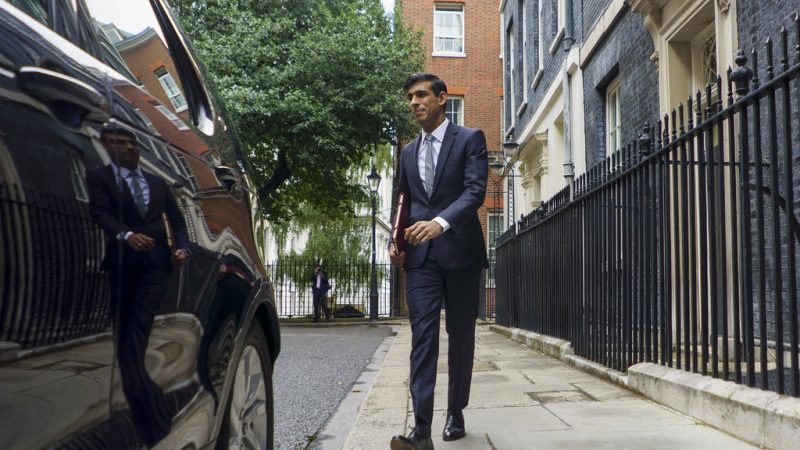Establishment think tanks are pushing policies that will let the rich off the hook, ahead of the autumn budget.

Ahead of the autumn 2020 budget, establishment think tanks are pushing their usual agenda of hitting the average household – while leaving redistribution off the political agenda.
The slash-and-burn right are less concerned about rebuilding the economy by reviving manufacturing, science and technology or a constructing a new green deal.
That’s despite the fact that the government can borrow money cheaply or even create its own money, as it has shown with the use of £745bn of quantitative easing to bail out banks – and again now during the coronavirus pandemic.
Imagine if that was used to build new industries or eradicate poverty?
In April 2010, UK public debt was £960bn. By February 2020, after a decade of austerity, it reached £1,791.5bn. The average wage remained flat and the economy stagnated.
Sadly, neoliberals are pre-occupied with the dogma of balancing the government’s books – which in reality can’t be done without rebuilding the economy and increasing the purchasing power of the masses.
Think tank watch
This week the Institute for Fiscal Studies recommended substantial rises in the rate of income tax, National Insurance (NI) and VAT. It recommended that the 20% basic rate of income tax could be increased by two or three percentage points and that the 40% higher rate could also go up. Previously, it suggested the government should stop raising the minimum wage.
The Institute of Economic Affairs has also called for a higher rate of VAT, and an expansion of the range of goods and services that it applies to. It also wants the government to abandon the triple-lock on the state pension. At around 29% of average earnings, the state pension is the lowest amongst industrialised countries.
Proposals to increase the basic rate of income tax, VAT and NI for the average worker are regressive. They hurt the poorest the most. Those who are less well-off spend most of their income on everyday items, such as food clothing, shoes, transport, and fuel, and have a greater multiplier effect on the economy. Any erosion of their income is damaging to economic recovery and must be ruled out.
Better ideas
There are plenty of alternatives and they must be used to redistribute and reduce inequalities. HMRC says that last year it failed to collect £31bn of taxes. Other studies estimate the amounts to be between £58.6bn and £122bn a year. So the government needs to go after the rich and giant corporations dodging taxes at a grant scale.
Tax fairness can produce revenues and a more equal society. A key principle must be to tax increases in income/wealth through earnings, dividends and capital gains in the same way. The failure to do so encourages all kind of tax dodges.
Currently, no income tax is levied on the first £2,000 of dividends. The remainder is taxed at rates between 7.5% and 38.1%. Yet income from earnings is taxed at rates between 20% and 45%. This anomaly primarily benefits the well-off. By taxing dividend income at the same rates as earnings, the government could raise up to £29bn over a five year period.
The first £12,000 of capital gains are tax free. Depending upon the nature of the gain, capital gains tax is levied at rates ranging from 10% to 28% compared to marginal rates of income tax of 20% and 45%. The abolition of disparities could raise £9bn.
There must be no increase in the NI for most workers. Employees pay NI at the rate of 12% on incomes between £792.01 and £4,167 a month. Beyond that, a flat rate of 2% is levied. The less well-off and the average earners pay a higher proportion of their income in NI than the rich. The 2% rate needs to be raised in a graduated manner on incomes above £100,000 and £150,000 a year.
Corporations have enjoyed massive tax cuts since 2010. The headline corporation tax rate has been reduced from 28% to 19%, though many corporations pay less. Labour’s 2019 manifesto estimated that a gradual reversal of the rate of corporation tax to 26% could have raised £23.7bn. Just raising it to 24%, the global average rate, could raise £12bn next year, rising to £17bn in 2023-24.
The government should also examine other Labour proposals which do not erode the purchasing power of the masses. For example, a financial transaction tax (FTT) has long existed in the UK. A modest level of tax or duty of 0.5% is already paid on the purchase of shares. Labour’s manifesto proposed to extend FTT to corporate bonds and equity and credit derivatives. It was estimated that this would raise around £8.8bn.
The above is by no means an exhaustive list of policy options. The intention here is to challenge the narratives offered by the usual suspects: promoting the idea that austerity and hitting pensioners and average income households is somehow the road to economic nirvana. That ideology has already failed.
We need to use tax policy to reduce inequalities and improve the purchasing power of the public. That is the only durable way of building a sustainable economy.
Prem Sikka is Professor of Accounting at University of Sheffield and Emeritus Professor of Accounting at University of Essex. He is a Contributing Editor to LFF and tweets here.
To reach hundreds of thousands of new readers we need to grow our donor base substantially.
That's why in 2024, we are seeking to generate 150 additional regular donors to support Left Foot Forward's work.
We still need another 117 people to donate to hit the target. You can help. Donate today.



